e-OTI/OnTheInternet Archives
All articles from e-OTI are available from the archives. Selected articles from previously-issued
printed editions are also available. Complete printed back issues
are available from the ISOC Store.
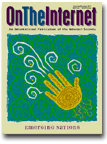 |
|
November/December 1997
Policy Constraints to Electronic Information Sharing in Developing
Countries
By Mike Jensen
The author's observations were made during the course of eight
years' work to develop Internet access in Africa. His experiences
may be of use in other developing countries.
Mexican Women’s Movement Makes the Internet Work for Many Women
By Erika Smith
Online women's groups in Mexico have mobilized to ensure that
the Mexican government lives up to all its signed commitments
at the Beijing women's conference.
Key Policy Issues in Emerging Nations: Uzbekistan
The Internet made it's way to Uzbekistan in 1995. How has it faired,
and what challenges will it face in the future?
|
|
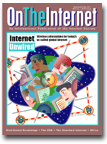 |
|
September/October 1997
Internet Unwired
By Michiel Hegener
Is the term global Internet really appropriate when hundreds of
millions of people in less-developed nations have never heard
of datacommunications? To be a truly global Internet means reaching
beyond today's traditional fiber-optic communications technologies
to some of the unwired alternatives that may help connect the
rest of the world.
Internet Connectivity for Africa
By Mike Jensen
On the heels of INET's Developing Nations Workshop, the author
reports on the latest Internet technology developments in Africa
and reveals how governments and economic conditions are influencing
their growth.
Waiting for Synthesis
By Wendy Rickard
The only thing more predictable than the hype surrounding the
Internet is the skepticism that quickly replaced it. If the recent
flood of technodoubting tells us anything, it should remind us
that it is the combination of promise and doubt that leads to
success.
|
|
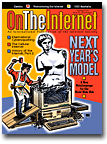 |
|
July/August 1997
A Brief History of the Internet, Part 2
By Barry M. Leiner, Vinton G. Cerf, David D. Clark, Robert E.
Kahn, Leonard Kleinrock, Daniel C. Lynch, Jon Postel, Lawrence
G. Roberts, and Stephen Wolff
In this second of our two-part series covering the history of
the Internet, the authors take us back to 1969, when the request-for-comment
procedure began, through the restructuring of the various bodies
involved with standards and development in the 1970s and 1980s,
and, finally, to today's explosive commercialization of what was
once a resource-sharing tool for researchers, scientists, and
educators.
On the Net, Through the Air, In Your Hands: Cellular Technology
and the Future of the Internet
By Janet Perry
Cell phones and laptops have become increasingly familiar sights
at bistros, on the street, and even on the beach. If you're a
member of the must-be-connected-without-the-cord crowd, you may
soon find yourself updating your home page from those locations
as well. Find out where the technology behind the cellular-Internet
merger stands and what it may mean for developers, businesspeople,
corporations, and the media.
|
|
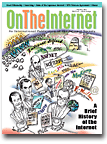 |
|
May/June 1997
A Brief History of the Internet, Part 1
By Barry M. Leiner, Vinton G. Cerf, David D. Clark, Robert E.
Kahn, Leonard Kleinrock, Daniel C. Lynch, Jon Postel, Lawrence
G. Roberts, and Stephen Wolff
The authors-several of whom were directly involved in the development
and evolution of the Internet-share their views of the Internet's
origins and history, concentrating on four distinct aspects: technological,
operations and management, social, and commercialization.
It'sAlreadyTaken.com
By Wendy Rickard
The growing popularity of domain names as commodities is challenging
legal and public policy structures as well as the DNS infrastructure.
But if cyberspace promises near-limitless resources for businesses
and individuals, why are so many worried about getting-and keeping-the
domain names they want? It's time to think beyond the code and
create a future in which domain names are irrelevant.
Internetship: Good Citizenship on the Internet
By Nicholas R. Trio
More people than ever are participating in cybercafés, cybernewsstands,
and cyber front offices, proving that the Internet has become
the place to meet, attend classes, and work. As its function within
society grows, so does the need for a commonly shared set of guidelines
defining acceptable and unacceptable behaviors.
|
|
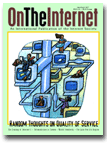 |
|
March/April 1997
Random Thoughts on Delivering End-to-End Quality of Service on
the Internet
By Paul Ferguson
Delivering quality of service is more important than ever for
reasons of congestion and simple commercial differentiation. But
what is the long-term implication of such prioritization? And
will it work?
Fixing the Internet
By Wendy Rickard
Initiatives such as Internet 2 may offer relief from the network
congestion and traffic that are frustrating users, but there are
many other problems with the Internet that need to be fixed.
Will Commercial Networks Prevail in Emerging Nations?
By Larry Press
Part of the Emerging Nations series.
|
|
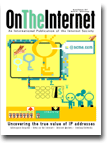 |
|
January/February 1997
Do Internet Addresses Have a Value?
By Geoff Huston
In today's mass marketing of the Internet, IP addresses have a
perceived if undefinable value. It is the relationship between
its uniqueness, routability, contiguous size, and utility factor
that may be the key to uncovering its true value.
News on the Internet: Technologies and Trends
By Dr. Yuri Quintana
The Internet and other multimedia technologies are changing the
way we look at news-where it comes from, how it is organized,
and how we receive it.
Back to the Future
By Donald M. Heath
The generation and distribution of electricity spawned whole industries
and eventually led to a decidedly different role for power companies
than originally imagined. That parallel process is happening today
with relation to the Internet. How will the telecommunications
companies and the PTTs of the world manage this opportunity?
Seeding Networks: The Federal Role
By Larry Press
From Claude Chappe's semaphore towers to Morse's telegraph to
ARPANET, the federal government-both abroad and within the United
States-has historically been a vital force in getting technological
development up, rolling, and to the people.
The Internet and Global Trade: Potential for the Asia-Pacific
Region
By Madanmohan Rao
The Eye on Emerging Nations column focuses on the Internet's impact
on trade in Asia and the Pacific.
|
|

